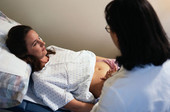- 7 Best Breads for Maintaining Stable Blood Sugar
- Gelatin vs. Collagen: Which is Best for Skin, Nails, and Joints?
- The Long-Term Effects of Daily Turmeric Supplements on Liver Health
- Could Your Grocery Store Meat Be Causing Recurring UTIs?
- Are You Making This Expensive Thermostat Error This Winter?
- Recognizing the Signs of Hypothyroidism
- 10 Strategies to Overcome Insomnia
- Could Artificial Sweeteners Be Aging the Brain Faster?
- Techniques for Soothing Your Nervous System
- Does the Water in Your House Smell Funny? Here’s Why
X-Rays, Other Scans Generally Safe in Pregnancy: Report


Radiation from X-rays and other medical imaging tests doesn’t seem to pose a risk to pregnant women or their fetuses when used properly, researchers report.
“While care should be taken to protect the fetus from exposure, most diagnostic studies are generally safe, and the radiation doses from these studies are well below thresholds considered risky,” said orthopedic surgeon Dr. Jonas Matzon, of the Rothman Institute of Thomas Jefferson University in Philadelphia. Matzon is lead author of the new report.
About 5 percent to 8 percent of pregnant women suffer traumatic injuries, such as broken bones and muscle tears, Matzon and his colleagues said in a news release from the American Academy of Orthopaedic Surgeons. Car crashes are the most common cause, and doctors often order medical imaging studies to assess these injuries, the study authors added.
But some pregnant women and their physicians worry that radiation from imaging studies might harm their baby, the authors said.
Still, proper diagnosis and treatment of traumatic injuries is important because they are the leading cause of non-pregnancy-related death among expectant mothers, according to background information in the news release.
There’s no known risk to fetuses from ultrasound and MRI, and they are considered safe for pregnant women, according to the report published in the August print issue of the Journal of the American Academy of Orthopaedic Surgeons.
X-rays of the limbs and spine expose the fetus to minimal doses of radiation. But CT scans of the pelvis expose a fetus to higher doses of radiation, and this type of test requires greater consideration, the researchers said.
It’s known that high levels of radiation exposure can harm the developing fetus. Overall, however, the risk of harm from medical imaging is proportional to the radiation dose and the gestational age of the embryo or fetus, the study authors said.
“If a patient requires multiple scans and repeated doses of radiation, a consultation with a qualified medical physicist should be considered to determine estimated fetal dose,” Matzon and his colleagues concluded in the news release.
More information
The U.S. Food and Drug Administration has more about X-rays during pregnancy.
Source: HealthDay
Copyright © 2026 HealthDay. All rights reserved.










